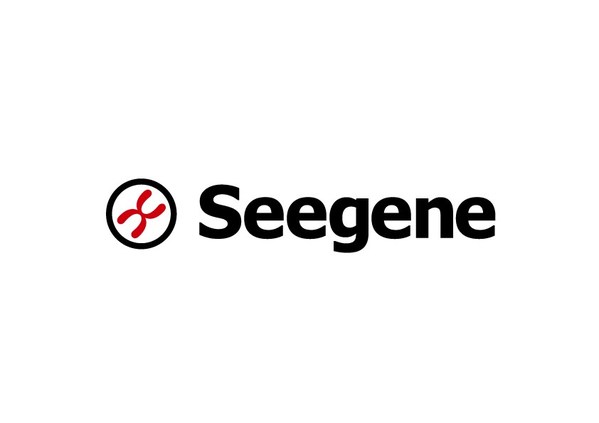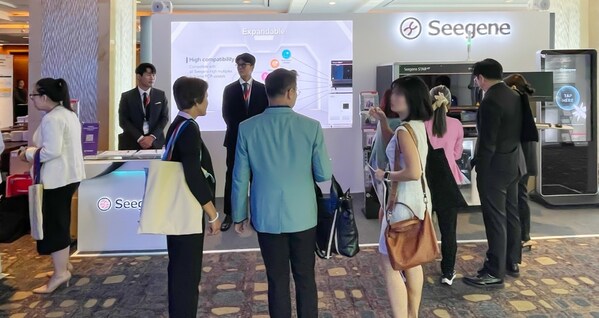 |
- Showcases Allplex™ HPV products designed to test for 14 high-risk HPV genotypes
- Advocates HPV testing for early diagnosis and prevention of cervical cancer
- Aims to accelerate the widespread adoption of syndromic PCR testing to create "a world free from all diseases"
SEOUL, South Korea, July 16, 2024 /PRNewswire/ -- Seegene Inc. (KQ096530), a leading South Korean company providing a total solution for PCR molecular diagnostics, demonstrated its human papillomavirus (HPV) diagnostic products and underscored the critical importance of HPV screening test at the Asia-Oceania Research Organization in Genital Infection and Neoplasia (AOGIN) conference, held in Seoul, South Korea from July 11-13.

Seegene exhibits its booth and demonstrates the HPV diagnostic products with STARlet-AIOS™ at AOGIN 2024 on Thursday, July 11-13, 2024
At the AOGIN, Seegene presented its advanced technologies for identifying viruses linked to cervical cancer. The company organized an exhibition booth and hosted a symposium session under the theme of 'Navigating clinical guidelines and implementations for HPV cervical cancer screening.'
The company showcased its unique quantitative PCR technology-based HPV diagnostic products, 'Allplex™ HPV HR Detection' and 'Allplex™ HPV28 Detection'. The Allplex™ HPV HR Detection is designed to test for 14 high-risk HPVs, including types 16 and 18, in a single tube. The Allplex™ HPV28 Detection is designed to test for 28 HPVs, in two tubes, including 19 high-risk types and 9 low-risk types, in two tubes. The products are ideal for cervical cancer prevention and follow-up management.
The company also introduced Seegene's STARlet-AIOS™, a fully automated molecular diagnostic testing system that streamlines the entire PCR process from nucleic acid extraction to result analysis, along with SG STATS, the company's premium platform of advanced statistical analysis.
At the symposium session hosted by Seegene on July 11, Dr. Lan Xu from the Shanghai Jiao Tong University of Public Health in China presented a lecture on "Clinical validation of human papillomavirus assays for cervical cancer screening via the VALGENT framework." Dr. Shin-Wha Lee from the Asan Medical Center and University of Ulsan in Korea showed her study on "Incorporating HPV testing with genotypes in population-based screening programs."
"At AOGIN, we were able to showcase the excellence of Seegene's PCR testing technology and HPV products. We expect our HPV products to be adopted in cervical cancer screening programs in more countries," said Daniel Shin, Executive Vice-President and Chief Global Sales and Marketing Officer at Seegene. "We are currently operating a campaign in the global market to raise awareness about the benefits of syndromic PCR testing, including simultaneous testing for HPV and sexually transmitted infections (STIs). We believe the campaign will pave the way for the widespread adoption of syndromic PCR testing, helping to realize "a world free from all diseases."
Seegene's syndromic quantitative PCR technology is simultaneous multiplex molecular diagnostic technology based on real-time PCR. It allows for the detection of various pathogens causing similar symptoms in a single tube, facilitating fast and accurate diagnosis. Furthermore, analyzing the cycle threshold (Ct) value helps determine the extent of the infection, which enhances medical practice. Seegene is the first to globally commercialize '3 Ct' technology, which can provide the Ct value of three targets in one channel.
Cervical cancer is the fourth most common cancer among women worldwide, with the second-highest mortality rate. According to the World Health Organization (WHO), approximately 600,000 women are newly diagnosed with cervical cancer each year globally, resulting in 340,000 deaths. In the Asia-Pacific region alone, about 270,000 women are diagnosed annually, with over 140,000 deaths reported. The WHO has set a target to achieve 70% cervical cancer screening coverage by 2030, a significant increase from the current 20%. In 2020, only 33% of women had been screened for cervical cancer at least once.
There are about 200 HPV genotypes, of which 99.8% of cervical cancers are caused by HPV. Types 16 and 18 account for 70% of cervical cancer, while 19 high-risk types are responsible for 90% of all cancer cases. The progression to cancer depends on the genotype of the HPV infection, the extent of the infection and co-infection. Since most HPV infections do not present clear symptoms, accurate detection is critical for the early diagnosis of cervical cancer. Recently, many countries have been recommending HPV testing instead of the Pap smear for cervical cancer screening.
About Seegene
Seegene has 23 years of dedicated R&D, manufacturing, and business experience around syndromic quantitative PCR technologies, which was highlighted during the COVID-19 pandemic when it provided over 340 million COVID-19 tests to more than 100 countries worldwide. The core feature of Seegene's unique syndromic PCR technologies is the ability to simultaneously test 14 pathogens that cause similar symptoms in a single tube and provide quantitative information on the infectivity profile to correlate with the severity of illness.
About AOGIN 2024
The AOGIN, founded in 2004, comprises of 25 member countries in Asia and Oceania. The organization hosts international academic conferences focused on the treatment and prevention of cervical cancer. This year's conference in Seoul attracted over 500 experts from 22 countries, including China, Japan, and India, who shared the latest research findings and clinical practices regarding HPV.
source: Seegene Inc.
《說說心理話》青少年自殺率上升,如何分辨求助訊號?社工分享陪伴的重要性► 即睇






























